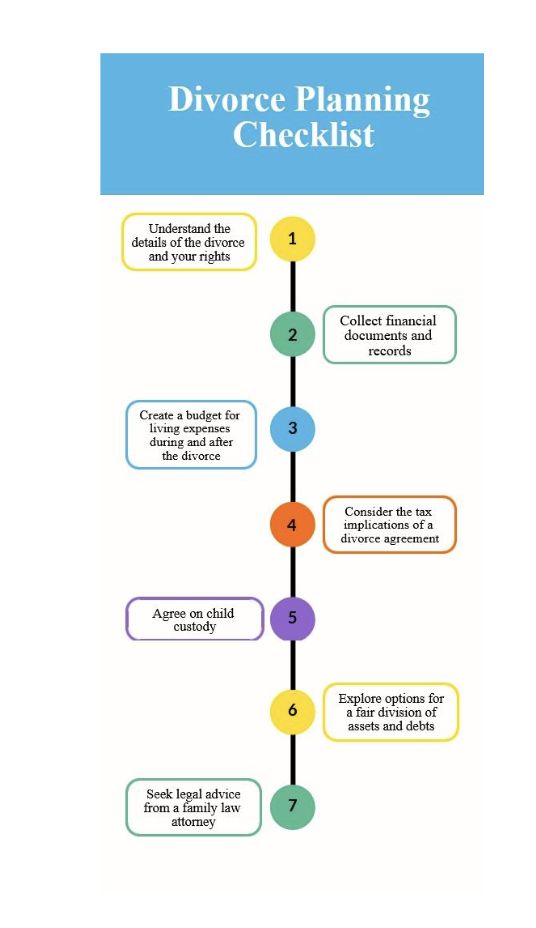Divorce Planning Checklist: What You Need To Know
Before you make the final decision to divorce, you need to prepare for this process in advance.
Understand the details of the divorce and your rights
Before you start the divorce process, you should familiarize yourself with the nuances of family law in your state to make sure you follow all the necessary guidelines. When creating your divorce checklist, make sure you are aware of any deadlines or time frames that need to be met for the process to move forward.
It is important to have a basic understanding of your rights so that you can protect yourself during the divorce process. You should familiarize yourself with your rights regarding:
- payment of alimony;
- child custody decisions;
- division of property and debts.
By familiarizing yourself with such nuances in advance, you will be better prepared for any developments during negotiations, divorce decree modification or court proceedings.

Collect financial documents and records
This way you will have a list of income or deductions made in recent years. It is also important to collect any other documentation related to debts or obligations, such as
- mortgage loans
- car loans; and
- student loans, etc.
Information about the exact amount of assets and debts can be important when dividing property in a divorce. It is important to collect any other documents related to income, real and personal property, or wills, including free divorce forms in Pennsylvania, which can be provided by the court. This is crucial for the court, as it needs to determine who has legal rights to the assets and what assets are to be divided during the divorce. If you have all this information, the process of planning a divorce will go much easier for everyone involved.
Create a budget for living expenses during and after the divorce
If either party expects alimony or child support, this should be included in your post-divorce budget. You should also be prepared for additional expenses related to raising children or starting a new family. It is important to consider possible future needs, such as retirement savings or college tuition. By taking all of these potential expenses into account, you can create an accurate budget that reflects both your current and future financial situation.
It’s important to remember that creating a budget for living expenses during and after a divorce is only one step on the divorce checklist. To ensure a successful transition to your new life, you should consider other factors such as:
- estate planning;
- changes in tax return status;
- insurance coverage, etc.
More categories of divorce expenses and their share in the total budget are presented in this statistical table:
| Category | Percentage of Total Expenses |
| Attorney Fees | 35% |
| Court Fees | 10% |
| Mediation Fees | 5% |
| Custody Evaluations | 10% |
| Appraisals | 5% |
| Counseling/Therapy | 10% |
| Moving Expenses | 10% |
| Other | 15% |
Planning and addressing these issues in advance will help minimize stress and ensure that preparations for the divorce process are as successful as possible. Consider the tax implications of a divorce agreement, as well as the complexities between child support and salary increases.

Consider the tax implications of a divorce agreement
If one of the spouses receives assets from the other during the divorce, this may oblige him or her to pay capital gains tax on these assets when they are eventually sold. It is also important to consider whether alimony or other types of support will be paid to one spouse, as well as the potential impact on retirement accounts or other investments held by either party.
It should be noted that certain aspects of a divorce agreement may have different tax consequences depending on your place of residence. Make sure you understand any state laws that apply to your situation. Consider how you will pay your taxes after the divorce is finalized. Consistently following these steps will ensure that your finances are protected throughout the process and keep you peace of mind while you settle all issues.
Agree on child custody
Prepare a detailed plan of what rights and responsibilities both parents will have after the divorce with regard to parenting, financial support, and other issues. You may also need a court order if necessary to make sure that both parties adhere to the agreed-upon terms.
You should make sure that your divorce planning checklist includes provisions for keeping all child custody and child support documents up to date. This includes keeping records of payments made or received, as well as any changes in child support amounts. Keep this information organized and up-to-date so you are protected from possible misunderstandings or disputes later on during the process of planning a divorce.

Explore options for a fair division of assets and debts
You should have an idea of the jointly acquired property and what things are non-marital and not subject to the division after the divorce. This should also be part of the divorce preparation checklist. It is also important to consider any potential tax consequences associated with the division of certain assets so that you can make informed decisions and consider your next steps.
Before going to court, consider mediation or other alternative dispute resolution. Mediation is an effective way to negotiate a fair settlement without the need for expensive litigation or lengthy negotiations between lawyers. When creating your divorce checklist, consider these tips to ensure a fair division of assets and debts after the divorce.
Seek legal advice from a family law attorney
A qualified professional can provide invaluable advice on divorce planning and ensure that all legal issues are properly addressed. An experienced lawyer will review your checklist, identify potential problems, and provide useful information on how to protect your rights and interests throughout the process. They will help you understand the laws governing divorce in your state and make sure you follow the proper procedures. In addition, a lawyer can recommend the following:
- how to divide assets and debts;
- how to agree on child custody arrangements;
- how to make sure that any decisions made are in the best interests of both parties.
A qualified family law attorney will check that you are properly prepared for a complex divorce proceeding, providing important information about its legal aspects.
Now let’s wrap it up with this infographic with all the checklist points for planning a divorce:

